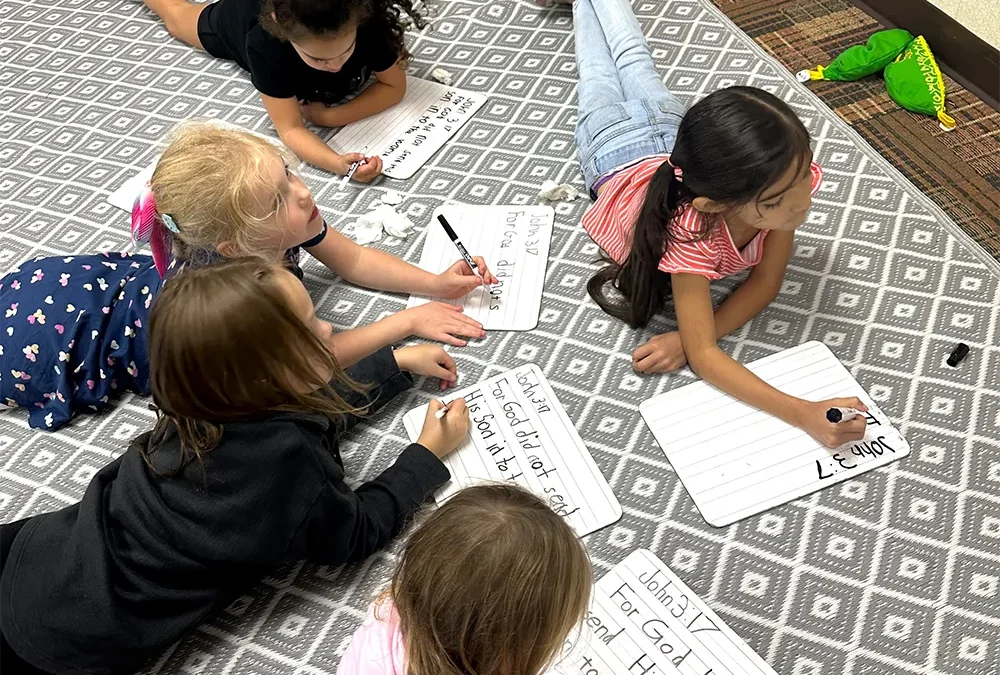Successful Children
How do we measure success? Do we view dollars and “likes” as the standard of measure? Materialism, social status, and any other external measure falls short of true success. For parents and teachers, I would posit that children hold the greatest stake in our measure of success. No other investment has greater potential for infinite returns. No matter where we focus our investments, it is imperative that we understand key factors that impact our investing practices.
From a biblical perspective, Scripture clearly presents external measures of success as far less important than matters of the heart. The treasures of this world are susceptible to the whims of society; the treasures of eternity will last forever. If I posed the question, “What is more important: your wealth, your social status, or your child?” Every parent and teacher I know would immediately identify children as the most important. But what does that look like on a day-to-day basis? How do we know we are investing well in the children in our care?
Raising and teaching children is not for the faint of heart. It’s the most demanding—and the most rewarding—investment we can make. It’s impossible to do well if one is isolated, uninformed, or self-centered. Effective parents and teachers are collaborative, well-informed, and centered on what is best for their children and students. Effective parenting and teaching produces children and teenagers who are resourceful, relational, responsible, and resilient. Let’s look at two factors that come into play long before your child’s first day of school: brain health and parenting.
Nature and Nurture
When a child comes to school, they are already equipped with skills that have been developing since birth. These skills vary widely from one child to the next, based on their nature (physiology and genetics) and nurture (external environments, including parenting). Until a child starts school, parents provide the vast majority, if not all, of the ingredients that contribute to their child’s development. On the first day of school, teachers begin to contribute additional components to the nurture side of development. Ideally, their contributions will build on and further develop the solid groundwork already laid at home.
If you’re reading this blog, it’s highly likely that you are investing in the lives of children in some way. It’s safe to presume that, like the parents and teachers at Riviera, you want to continue learning more about the key factors that will impact your returns. Time is on our side, but only if we use it wisely. Pause for a moment and take stock: What have you already done today to help your child become resourceful, relational, responsible, and resilient?

In the late ‘90s, I was interviewing for a position working with children who had specific learning disabilities. The interviewer pulled out a student’s file and read the summary, which described many characteristics of a student with a visual processing disorder. He then asked me what types of interventions I would do with the child. I was happy to describe several solid recommendations that I knew to be effective. Several times, he pressed for further details. Finally, he said, “Actually, all this sounds great, but it’s not going to help if the child needs glasses. You need to check for PHYSICAL problems before you try to solve the mental challenges.”
I’ve never forgotten his advice. We tend to focus on the minds of our children—and rightfully so! Parents and teachers want to make sure children are making developmentally appropriate progress. We continually evaluate their responses, attitudes, attention span (or lack thereof), and learning. But when you look at the organ that houses the mind, it is the brain that comes into clear focus. A healthy brain is the most critical factor in determining a child’s ability to focus, process, and retain the things they learn at school.
Brain Health
The world-renowned psychiatrist, Dr. Daniel Amen, has spent 40 years using SPECT scans to closely examine the physiology of the brain. His research provides data from 250,000 3-D pictures of traumatic brain injuries (TBI), trauma, depression, anxiety, and ADHD, along with resources to help prevent and heal from these challenges. There are dozens of things we can do every day to promote brain health. Some are obvious and relatively simple: drink more water, get plenty of sleep, and eat plenty of vegetables and other whole foods. Other factors are less well-known, such as flossing your teeth daily and increasing blood flow to your brain through regular exercise. The most important thing to understand is that our brains can heal when we provide them with a healthy environment.
Parenting and Teaching
Earlier this year, Dr. Amen and Dr. Charles Fay (president of the Love and Logic Institute) co-authored a book entitled Raising Mentally Strong Kids. It’s filled with practical, proven strategies that every parent and teacher can put to immediate use. Part 1 is called “Practical Neuropsychology for Parenting Success,” and Part 2 follows with “Tips and Tools for Turning Common Challenges into Strength of Character.” This book helps parents and teachers understand the basics of brain health and development, and it equips them to apply that knowledge to their interactions with children. I highly recommend it for every parent and teacher who takes seriously the investment they make in the lives of children every day.
It is my hope that we as parents and grandparents, teachers and coaches, will look beyond children’s behaviors, attitudes, and choices. We must recognize the impact of brain health and the influence of our daily responses to our children. While they are young, their success lies in our hands. It is the only way we can truly invest well.
